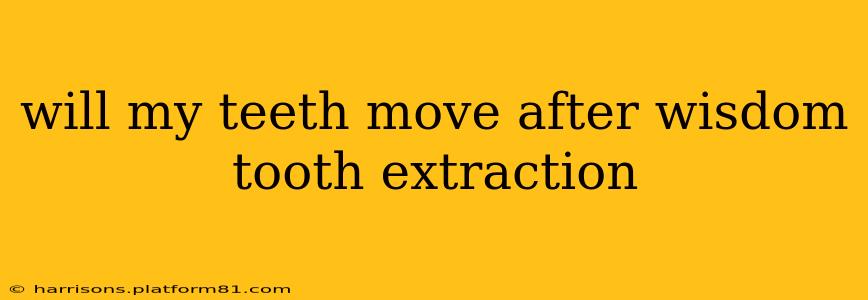Will My Teeth Move After Wisdom Tooth Extraction? A Comprehensive Guide
The short answer is: yes, your teeth can move after wisdom tooth extraction. While it's not guaranteed, it's a possibility many people experience, and understanding why it happens is crucial for managing expectations and potential post-extraction discomfort. This guide will explore the reasons behind tooth movement after wisdom tooth removal, what to expect, and how to mitigate any potential issues.
Why Do Teeth Move After Wisdom Tooth Extraction?
The primary reason teeth shift after wisdom tooth extraction is due to the loss of a tooth and the subsequent changes in the mouth's overall structure. Think of your teeth as a system of interlocking pieces – the removal of one piece disrupts the balance.
-
Natural Tooth Shifting: Your teeth are constantly undergoing subtle shifts throughout your life, driven by various factors like chewing forces and bone remodeling. The removal of a wisdom tooth accelerates and amplifies this natural process. The space left behind becomes a target for neighboring teeth to migrate into.
-
Bone Resorption: After wisdom tooth extraction, the bone supporting the tooth begins to resorb (dissolve). This can further destabilize the surrounding teeth and increase their likelihood of shifting.
-
Adjacent Teeth Migration: The most common movement is the neighboring molars shifting forward to fill the gap left by the extracted wisdom tooth. This is especially true if the wisdom teeth were impacted or partially erupted, preventing the other teeth from finding a natural equilibrium.
How Significant is the Tooth Movement?
The degree of tooth movement varies significantly from person to person. Several factors influence this:
- The Position of the Wisdom Teeth: Impacted wisdom teeth, requiring more extensive surgical removal, often lead to more significant tooth movement.
- The Age of the Patient: Younger individuals tend to have more adaptable bone, resulting in a higher likelihood of noticeable tooth movement.
- The Overall Dental Health: Patients with pre-existing dental issues may experience more pronounced shifting.
What Can I Do to Minimize Tooth Movement?
While you can't entirely prevent tooth movement, you can take steps to minimize its impact:
-
Follow Post-Operative Instructions Carefully: Your dentist will provide specific instructions regarding aftercare, including cleaning, diet, and medications. Adhering to these is crucial for proper healing and minimizing complications.
-
Consider an Orthodontic Retainer: In cases where significant tooth movement is anticipated or already occurring, your dentist might recommend a retainer to stabilize the surrounding teeth. This can be a removable retainer or a fixed retainer, depending on your specific needs.
-
Regular Dental Checkups: Monitoring your teeth after extraction is critical. Regular checkups allow your dentist to detect any significant shifts and address them promptly before they cause more significant issues.
What if My Teeth Move Significantly After Extraction?
If you notice substantial tooth movement or experience any pain or discomfort, contact your dentist immediately. They can assess the situation, determine the cause, and recommend appropriate treatment, such as orthodontic intervention to realign your teeth.
Will My Bite Change After Wisdom Tooth Extraction?
Yes, it is possible. The shift in the position of your teeth after wisdom tooth extraction might affect your bite. Changes in your bite might lead to problems like difficulty chewing, jaw pain or temporomandibular joint (TMJ) disorders. Regular checkups with your dentist can help detect and manage any such issues.
How Long Does It Take for Teeth to Move After Wisdom Tooth Extraction?
The timeframe for noticeable tooth movement varies. It could be immediate or take months, or even years depending on individual factors.
Do I Need an Orthodontist After Wisdom Tooth Extraction?
This depends entirely on the extent of the tooth movement and your overall dental health. In many cases, no orthodontic intervention is necessary. However, if significant shifting occurs, your dentist may recommend consulting an orthodontist for appropriate treatment.
This information should not be considered medical advice. Always consult with your dentist or oral surgeon for personalized advice regarding your specific situation and any concerns you may have about tooth movement after wisdom tooth extraction.
